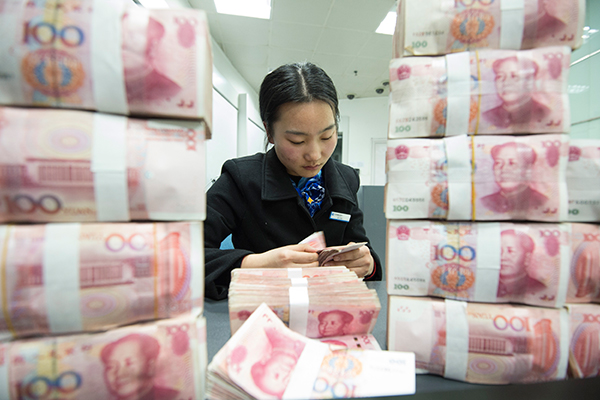Fiscal and monetary moves yielding results


Efforts to boost protection of intellectual property and optimize business environment
China has continuously stepped up efforts to implement monetary and fiscal policies to stabilize the economy. These efforts have helped bolster market expectations and confidence in the Chinese economy from enterprises, residents and foreign investors, economists said.
In the first two months of this year, the country's new yuan-denominated loans increased by 374.8 billion yuan ($55.83 billion) year-on-year to 4.11 trillion yuan. Aggregate financing to the real economy expanded by 5.31 trillion yuan, surpassing the growth over the same period last year by 1.05 trillion yuan, according to the People's Bank of China, the central bank.
Liu Ligang, managing director and chief China economist of Citigroup, said in an interview: "We have seen preliminarily the efforts made by the central bank, regulators and local governments at the previous stage. Figures for March may further prove that the transmission mechanism of China's monetary policy becomes effective gradually. If the economy further stabilizes and trade friction between the US and China declines significantly, a virtuous circle will be created over time."
In the Government Work Report delivered on March 5, Premier Li Keqiang said China will raise its fiscal deficit target to 2.8 percent of gross domestic product this year, up by 0.2 percentage point from 2018.
"It sends a highly positive signal, showing that the government does not want to launch a new round of aggressive economic stimulus. This is good for China's fiscal sustainability," Liu said.
Actually, if China could maintain an annual GDP growth of 6.1 percent, it will create 13 million new jobs a year - roughly the same as the average number of jobs created annually in the past five years, he added. Citigroup forecast that China's economic growth is likely to be 6.2 percent in 2019.
He highlighted the importance of tax cuts, a major difference between the latest round and the previous rounds of fiscal stimulus. Personal income tax cuts may range from around 400 billion yuan to 500 billion yuan. The size is fairly large, considering that China collected personal income taxes worth nearly 1.2 trillion yuan in 2017.
Wang Tao, head of Asia economics and chief China economist at UBS, said the size of tax cuts is larger than before.
"Reducing the corporate tax burden is positive for increasing corporate profits and will certainly help boost market sentiment," Wang said.
The country's plan to lower value-added tax rates for major industries, such as manufacturing, transportation and construction, will also benefit consumers and have a positive impact on GDP growth in the medium and long term, she added.
Besides, she said it is worth noting that the Government Work Report this year also stressed that China will further open the domestic market to foreign and private investment, strengthen intellectual property protection, and optimize the business environment.
At Citi's Asia-Pacific investor conference in Singapore in February, foreign institutional investors raised a lot of questions about the details regarding entering the China market, which shows that they will access the country's equity and bond markets for asset allocation step by step, according to Liu.
Compared with some other economies, China's capital markets have higher returns while they are not highly correlated with emerging markets. As a result, allocating assets to the country will help investors hedge against risk to a certain extent.
"Foreign institutional investors believe that China will truly further open its capital markets this time. A growing amount of portfolio investment will enter the capital markets more actively after the risk associated with China-US trade friction is significantly reduced. This will lead to revaluation of assets in the country," he said.




































